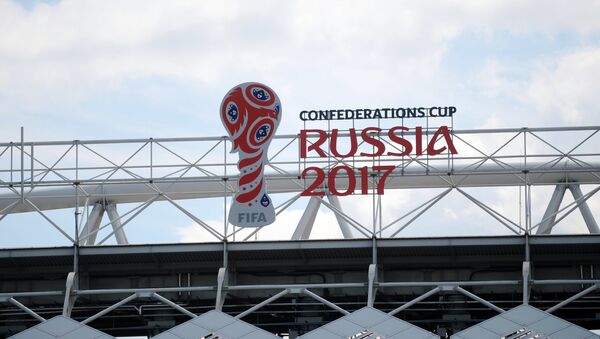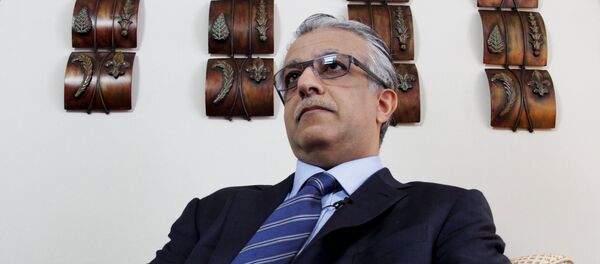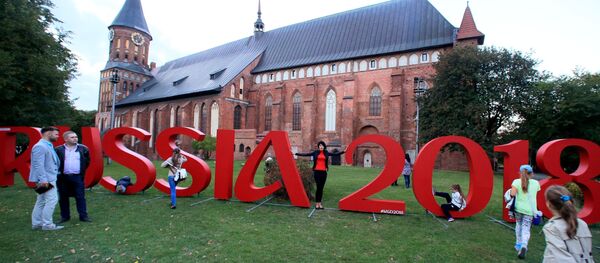The official also assured Sputnik that the Customs Service is prepared to help ensure the smooth running of the upcoming Confederations Cup events.
Appointed to his post eight months ago amid a government cadre reshuffle, Bulavin and his team went to work on a program to dramatically improve the efficiency of the FCS. Late last month, the agency approved what it calls a ‘Comprehensive Program for the Development of the FCS Up to the Year 2020.'
Speaking to Sputnik and other news agencies at the Rossiya Segodnya press center in Moscow on Friday, Bulavin outlined how, in addition to improving efficiency and reducing the administrative burden on business, the program's key goals include the wholesale computerization and automation of the customs service. The official stressed that the program includes concrete performance standards to measure the efficiency of its implementation and concrete plans for achieving the planned targets.
"We set some rather ambitious goals for ourselves with the program, [including] bringing the level of automatic registration of customs declarations up to 99 percent by 2020, and the level of automatic release of declarations up to 80 percent," Bulavin said, referring to imports in the ‘risk-free' customs clearance category.
Earlier this year, the FCS introduced another innovation: a risk-oriented customs approach which evaluates businesses engaged in the import and export of goods based on three categories of assumed risk. The agency uses about 30 separate indicators to evaluate risk, with companies and enterprises with a proven track record given certain preferences, like quicker processing times. The approach also includes measures meant to make the customs process more comfortable for small and medium-sized businesses with a bona fide record in work with the agency.
Bulavin noted that at the moment, only about 3,200 companies out of about 80,000 engaged in foreign trade fall under the ‘minimal risk' category (although they account for about 46 percent of total import/export operations). About 11,000, mostly smaller firms are listed as ‘high risk,' due to a record of problems in customs declarations, or other violations. The official admitted that this situation needs to be improved and that the agency's efforts, including the 2020 program, intend to do just that.
"We must work together with business to take all the necessary measures to ensure that the number of companies engaged in foreign trade that are part of the sector with minimal risk is as large as possible," Bulavin said. "All the opportunities exist for making this possible," he added.
In accordance with the program's aim of computerizing the work of the FCS, the agency plans to create electronic declarations centers in each of the eight regional customs administrations across Russia. According to Bulavin, this measure will substantially reduce risks of corruption, since the centralization of information will help eliminate the personal ties between would-be dishonest importers/exporters and customs inspectors.
On January 1, 2018, a new customs code for the Eurasian Economic Union will step into force. Bulavin told reporters that the FTC's comprehensive program "takes into account all the provisions and innovations spelled out in the new customs code." In other words, he said, the FCS is fully prepared for work under the new code, once it enters into force.
Bulavin focused much of his discussion with journalists on anti-corruption efforts, including his agency's efforts to limit gray imports of consumer goods, including from countries that face Russian countersanctions. For example, experiments are underway on the shipping of goods to reduce gray exports and imports. The FCS's so-called operational groups are also finding new ways to confiscate contraband, including checks on warehouses and wholesale trade centers instead of border checkpoints.
The FCS is also waging a battle against petty corruption and has a special anti-corruption department inside the agency. Bulavin outlined a series of measures, from preventative work, to the use of information technology, to criminal prosecution of bribe takers and givers. The official said that so far in 2017, 130 cases have been opened, one-third of those against bribe-taking customs officials, and two-thirds against dishonest businessmen.
Bulavin emphasized that in his experience, the best way to fight corruption at the agency level involves: a) making officials aware that they are being monitored by the relevant anti-corruption authorities; and b) making conditions of their work such that corrupt behavior is impossible, including through the use of the aforementioned information technology.
Ultimately, Bulavin stressed he was confident that the FCS has the resources it needs to achieve the goals outlined in the 2020 program, and that the agency's ambitious computerization and automation plans will help dramatically improve the efficiency of the service.
Asked about the FCS's role in the preparations for the 2017 Confederation Cup, to be held in Moscow, St. Petersburg, Sochi and Kazan between June 17 and July 2, Bulavin said his agency was ready.
"We are prepared to carry out prompt and high-quality customs clearance, both for fans and the participants," the official said. "The necessary staff has been prepared to deal with any irregularities that might arise."
Bulavin noted that the FCS has the necessary experience with work of this kind, from the 2014 Olympic Games to the Sochi Student Games, etc.
"We have the necessary experience and the operational resources for the four cities involved [in the Cup]. We are also in regular contact with the ministry of sport and minister of sports Mutko."
Finally, asked about Russia's growing status as a transit country for global trade, and his agency's efforts in this direction, Bulavin emphasized that Russia is uniquely positioned in this regard. The official recalled that in 2016, total customs transit through Russia amounted to some 76 million tons of goods.
At the same time, the official noted, "The general feeling is that our transit [capabilities] are not used to their full potential. If the FTC has a role to play, I can say that we are already working to improve things as far as transit is concerned. Even today, half of all transit declarations are done electronically. We plan to ensure that this figure seems a reasonable increase." Ultimately, Bulavin emphasized that the FTC will need to work in concert with other agencies to improve Russia's status as a transit state.






